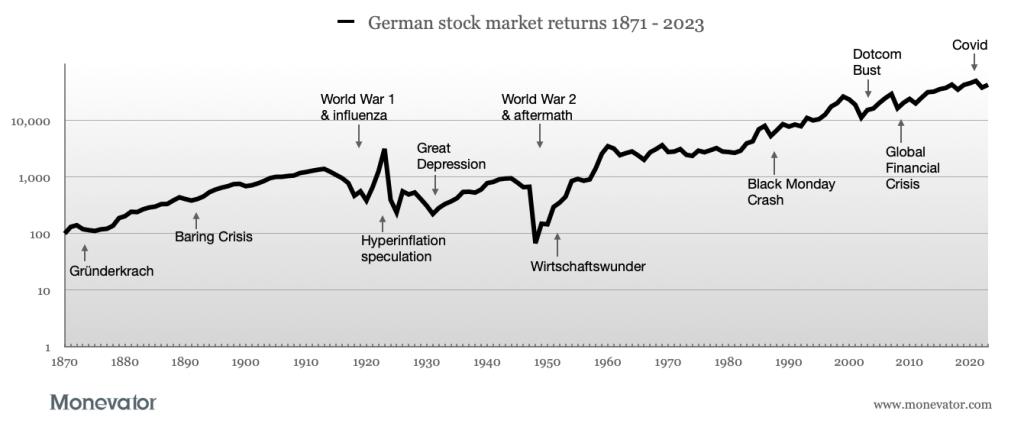
Where were you on 9/11? Do you remember when you first heard that Princess Diana had died?
What about when you truly realised what compound interest could do for you?
I know that I was in a Waterstones in Bayswater in London, browsing a book by – I think – Jim Slater.
I almost dropped it in shock when I saw the future.
Admittedly this ultra-niche appeal anecdote would be punchier if I could be certain which book of Slater’s I was reading– or even be sure that he was the author.
The truth is I’m not even confident what year it was.
Mid-to-late 1990s – and perhaps more ‘late’ than I’d like to concede. Me still in my 20s, just, thinking I knew it all but regularly getting my ideas turned upside down.
All that I remember very well.
Double Maths at A-Level, but it took a graph in a book and a few small numbers in an equation to show me a way that I hadn’t come up with myself.
Golden retrievers
Given that on every second date I go on the term FIRE comes up these days, I expect it will be hard for younger readers to believe there was a time when you had to ferret out this information for yourself.
No blogs, no YouTube, no financial Twitter or TikTok. No ‘finfluencers’. Nobody in your extended family who didn’t work until they were done unless they had kids, sold a business, got sick, or died.
No real-life role models for financial independence – let alone retiring early.
But that was how life was back then. You became interested in a subject and you followed a breadcrumb trail – through libraries, bookshops, the nascent Internet, and word of mouth. At the end might be a musical subculture, an Eastern philosophy, a passion for early Porsches. Some sexual fetish you never imagined existed.
It all took a lot of time but the journey was half the reward.
Today though, it takes about as long as it took me to type “today though” for you to have answers to everything at your fingertips.
Of course you still need to digest the material. And you must be more alert than ever to bogus nonsense. That’s the downside of getting rid of the gatekeepers of yesteryear.
You also need to know the right question to ask – trickier than it sounds when you might not yet have a clue about the answer.
In any event, today’s shortcuts are more like warp zones in Mario than incremental power-ups.
There’s no excuse anymore not to know how to do anything.
House-trained mutts
I suspect this abundant information is one of the frustrations that older people have with the young nowadays.
We – as I suppose I might as well get used to writing – might bemoan that the younger generation’s financial woes are due to avocado on toast or YOLO-ing away a potential house deposit.
But we also think there’s no excuse for them not to know better.
Because everyone can know all this stuff if they want to.
Never mind that ‘we’ have mostly been bailed out by rising house prices, decently well-paid jobs, and for 15 years by the near-absence of meaningful interest rates.
Nor that despite these tailwinds a large cohort of even professional people in their 40s and 50s remain slaves to their credit card debt – or are decades behind on saving for a pension.
I’m talking about the sort of people who might eventually cross the path of Monevator, you understand. Not the one in five who have no pension savings at all nor the many millions who would struggle to get their hands on just a few thousand pounds without taking out a loan.
Maybe knowledge isn’t everything, after all?
The dogged pursuit of financial freedom
I was thinking about all this after talking to the very bright son of a friend of mine who I’m convinced is on the brink of making a big mistake.
He’s in his mid-20s and he’s frustrated with “having no money”. So he’s about to chuck in a good thing – in my opinion – and make some massive compromises in the pursuit of more cash today.
I advised him to be patient and to look to the big picture.
As we talked the memory of my compound interest revelation in the bookstore bubbled up:
“I worked out when I got back home that if I could just save £500 a month for the next 25 years then I’d become a millionaire,” I explained.1
Unusually for a stealth wealther like me, I then delivered what I thought was the mic drop:
“So I started saving £500 a month – and I achieved that goal.”
My young disciple wasn’t phased. And I don’t think just because a million pounds isn’t what it used to be.
Turned out he’d heard of Mr Money Mustache. Spent a few hours going down the YouTube rabbit hole. Several years younger than when I had done so.
“FIRE, sure, yeah. Well you have to have £500 a month to do what you did,” he said glumly, before listing his monthly after-tax income (after, as best I could tell, a mandatory pension contribution), the rent for a room in a shared flat in a grimy bit of South East London, how much he spent in Morrisons on one visit last week, and what it costs to fill his car.
No, I don’t think he should be driving in London either. But it was hard to argue that he was living it up.
He told me he was thinking of moving back in with his parents.
Barking up the wrong tree
Yes I am the guy who said young people are already rich on account of their long time horizons.
But if they can’t begin to take advantage of that potential, then isn’t their youth a stranded, wasting, and illiquid asset?
I won’t go through the laundry list of ways in which the older generations have arguably been over-enriched and the young given short thrift during the past 20 years.
House prices and insufficient new home building, the cost of higher education, and politicians favouring pensioners covers most of it – with witless Brexit the icing on the cake.
Have a Google for hundreds of articles on the theme. There are even books on the generational divide.
But I will admit that this conversation gave me pause.
I think I know about all this stuff – yet my instinct had been to lecture this young man about compound interest rather than to truly hear him out.
In the way of a groovy geography teacher I had wanted to sound less like ‘we’ as the older generation when I was talking to him, and more like ‘us’.
But in reality, there I was at the front of the class and he was shaking his head at me not getting it.
In the dog house
What’s the killer takeaway? That I should talk less and listen more? That Britain needs to change its focus to the struggles of young people – especially those without rich parents? That I’m older than I think I am?
All true and maybe there isn’t a big revelation.
I’m pretty confident I could still reach financial independence if I started today. I see abundant opportunities that didn’t exist when I was my young friend’s age. He’s overly pessimistic.
I did enough stupid things on my journey to believe there was a margin of safety too. (I never benefited from the long property boom, and I could have made more of my career.)
But honestly? I do suspect it would be harder now. Even while still thinking he’s making a mistake.
Plus ça change, plus c’est la même chose and all that.2
This lad has run into the same concept that totally changed my life – and it has bounced right off him.
For all the guidance from blogs, YouTube videos, and social media influencers, every generation’s young people will do what they want to and have to, and make their own mistakes.
Those of us who went before are going to shake our heads.
And they’ll shake their heads right back at us.
Are you a younger person who thinks financial independence is harder to reach these days, despite all the information charting the path out there? Are you an older person with another perspective? Let’s have a productive discussion between the generations in the comments below!
Yes I used an aggressive rate of return back in those days. Somewhere between 12-15% from memory. Which turned out not to be too optimistic for me but maybe that was lucky. It is also not really the point.The more things change the more they stay the same.
The post Old dog, old tricks appeared first on Monevator.



